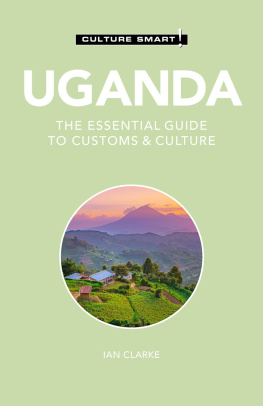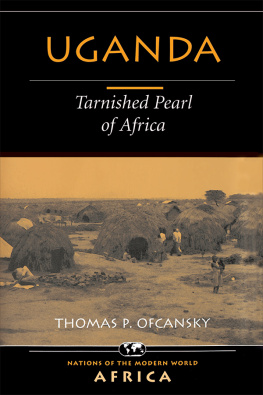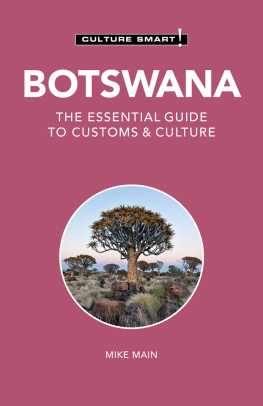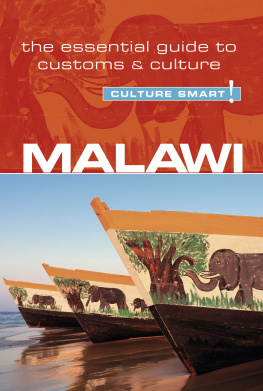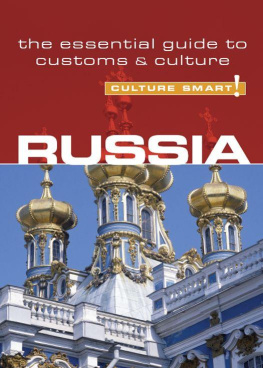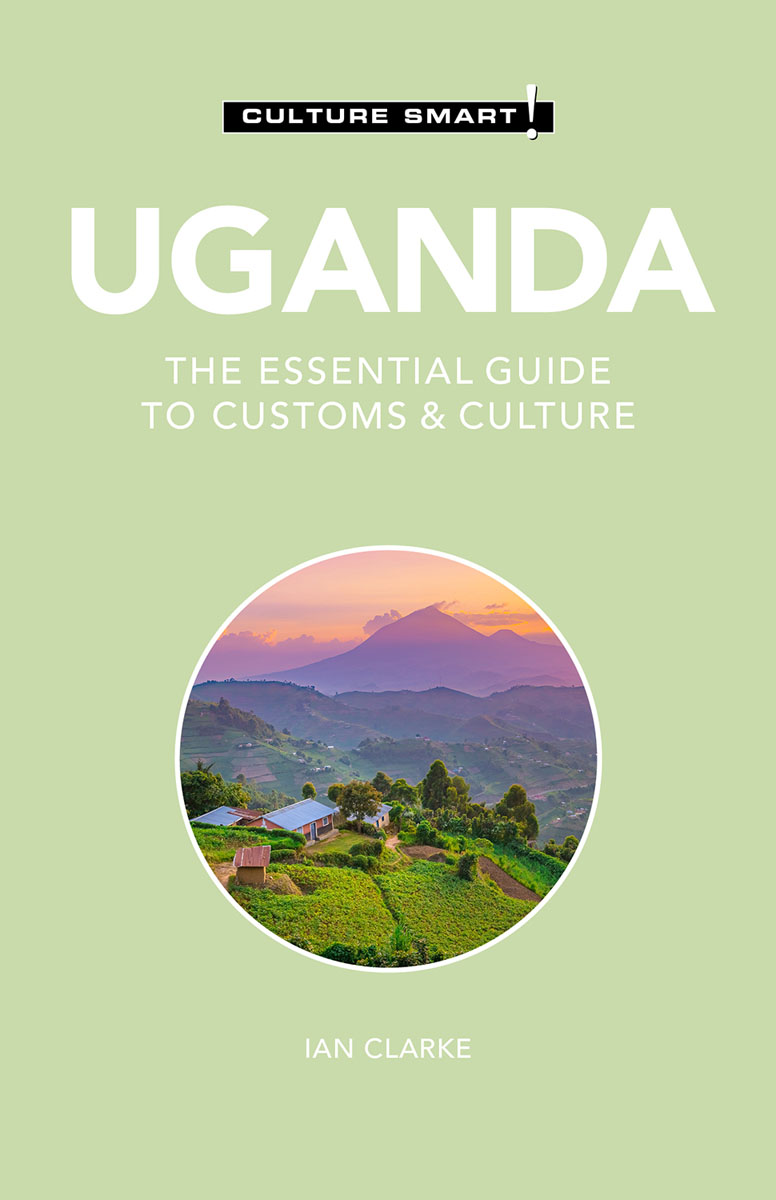
The real voyage of discovery consists not in seeking new landscapes, but in having new eyes.
Adapted from Marcel Proust, Remembrance of Things Past.
ISBN 978 1 78702 856 2
British Library Cataloguing in Publication Data
A CIP catalogue entry for this book is available from the British Library
First published in Great Britain
by Kuperard, an imprint of Bravo Ltd
59 Hutton Grove, London N12 8DS
Tel: +44 (0) 20 8446 2440
www.culturesmart.co.uk
Inquiries:
Design Bobby Birchall
Printed in Turkey
The Culture Smart! series is continuing to expand. All Culture Smart! guides are available as e-books, and many as audio books. For further information and latest titles visit www.culturesmart.co.uk
ABOUT THE AUTHOR
IAN CLARKE has lived in Uganda for more than thirty years. Born in Northern Ireland, he is also a Ugandan citizen and, as the Mayor of Makindye Division of Kampala, he was the first white elected politician. He first came to Uganda in 1987 after the civil war between Musevenis National Resistance Movement and the Obote regime ended. He writes a weekly social commentary in the Sunday Vision, Ugandas national newspaper, and has published two books, The Man with the Key has Gone and How Deep is this Pothole?
Dr. Clarke is a social entrepreneur and has founded a number of social businesses, including two hospitals, Kiwoko Hospital and International Hospital, Clarke International University, Clarke Junior School, and Clarke Farm. He lives in Kampala with his wife and family.
COVID-19
The coronavirus pandemic of 2020 affected millions of people around the world, causing unprecedented social and economic disruption. As the impact of this global crisis continues to unfold, in many countries social norms are being challenged, and enduring changes will be reflected in future editions of Culture Smart! titles.
CONTENTS
MAP OF UGANDA

INTRODUCTION
Once notorious for the tyranny of Idi Amin, immortalized in the film The Last King of Scotland, Uganda has for the last thirty-two years struggled to overcome its negative image. In this it has largely been successful, though not without some glitches along the way.
Uganda featured in CNNs top travel destinations in 2016. In addition to its game parks, home to the Big Five, it has the largest number of recorded bird species of any country, making it the richest African destination for birders. It is also the home of the famed mountain gorillas, and the mighty River Nile provides some of the best whitewater rafting in the world. Add to this an almost perfect climate and spectacular sightseeing, including the source of the Nile, Murchison Falls, the little Switzerland of Kabale, the volcanic lakes, and the Rwenzori Mountains, and one can understand why Winston Churchill called Uganda the Pearl of Africa.
But Uganda not only has wildlife and natural beauty to offer; the Ugandan people are what make it different. Drawn from more than twenty tribes, they represent a rich blend of traditions and culture. You can sample this in dance and song performances by groups such as the Ndere Troupe in Kampala, or you can wander through a village, and get to know the local people, since English is widely spoken. You will find them sociable, warm, and hospitable. Kampala is famous as the social capital of East Africa, the city that never sleeps, where every kind of nightlife is on offer. It is not the high quality of life that makes Ugandans happier than their neighbors, but their positive, optimistic outlook on life. Perhaps the years of adversity have made them appreciate the little that they have. This national characteristic, where Ugandans have traditionally shared what they have, makes them special. It is not possible to call in at a mealtime and leave without partaking of the family meal, and probably also being given a live chicken to take home.
The Uganda of today is a unique blend of beauty, tradition, and modernity. The media is relatively free, though it is best not to get involved in certain issues such as opposition politics or gay rights. The visitor will generally need to reach out to Ugandans first, as they have seen many foreigners come and go who are not really interested in their lives, and if you dont bother with them they will not bother with you. However, once you demonstrate your interest, they will accept you with open arms.
Inevitably there are cultural pitfalls for the unwary travelerdifferences in expectations, customs, and ways of behaving. This book provides key insights into Ugandan life and offers practical tips on how best to meet the Ugandan people on their own termsvital information for tourists and businesspeople alike.
KEY FACTS
Official Name | Republic of Uganda |
Capital City | Kampala | Pop. 4 million (greater Kampala) |
Main Cities and Towns | Jinja, Entebbe, Masaka, Mbarara, Fort Portal, Kabale, Gulu, Lira, Kisoro, Mbale, Arua, Kasesse, Iganga, Tororo, Busia, Kotido |
Area | 93,065.29 sq. miles (241,038 sq. km) | Slightly smaller than Oregon |
Geography | Bordered by Kenya, South Sudan, the Democratic Republic of the Congo, Rwanda, Tanzania, and Lakes Edward, Albert, and Victoria. | Lowest point: Lake Albert 2,037 ft (621 m). Highest point: Margherita Peak on Mount Stanley 16,765.09 ft (5,110 m) |
Regions | 4 regions: Central, Northern, Eastern and Western; 111 districts |
Terrain | Mostly plateau with a rim of mountains. Three main types of terrain: swamps, fertile plateau with wooded hills, and semi-arid areas in the northwest. | Uganda has 60 protected areas, including 10 national parks. |
Climate | Tropical with two dry seasons (December to February, June to August) | Uganda is more temperate than the surrounding areas due to its altitude. |
Population | 33,640,833 (growth rate 3.3%) |
Age Structure | 0-14 years: 48.9%; 15-24 years: 21.2%; 25-54 years: 25.5%; 55-64 years: 2.3%; 65 years +: 2.1% |
GDP | US $33.93 billion in 2020 | GDP per capita is US $823 (IMF figs.) |
Natural Resources | Copper, cobalt, hydropower, limestone, salt, arable land, the Nile, gold, petroleum |
Currency | Uganda Shilling (UGX) | 1 USD = 3,716 UGX (Sept. 2020) |
Language | English is the official language, with Swahili as the second national language. | Luganda is the most widely spoken tribal language in Central District. Other tribal languages spoken in the northern, western and eastern regions. |
Religion | Predominantly Christian, with 42% Protestant, 42% Catholic. Muslim 13%, others 3% |

